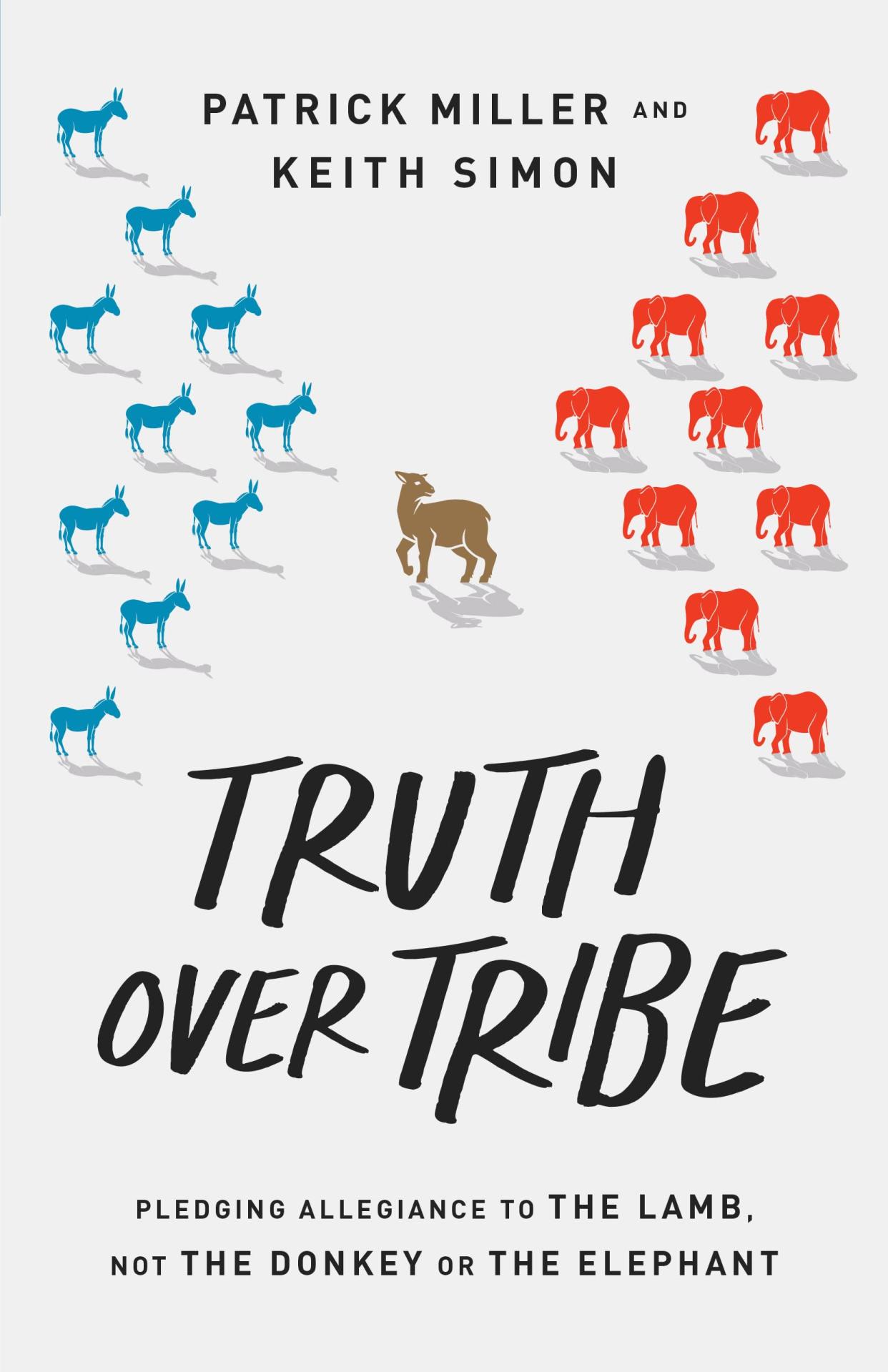Crossing pastors call Christians to embrace 'Truth over Tribe' in political, social arenas

Patrick Miller describes himself as a "recovering political tribalist."
Now a staff pastor at prominent Columbia church The Crossing, Miller first wholly engaged with electoral politics in 2008, and the race between Senator John McCain and future-President Barack Obama. Convinced an Obama victory would fix America's fractures, he later felt the inadequacy of his idealism.
This led Miller to question just how much Washington D.C. can do to restore one's particular place in the world. While he still affirms that national politics matter, he began to place more faith in local presence and not allowing greater divisions to impact the way we live in our communities.
"If my partisanship makes me dislike my neighbor who voted differently than I did, that actually makes my community a worse place to live," he said in a November interview.
Miller recalled this progression when discussing the motives behind Truth Over Tribe, a project he leads with follow Crossing pastor Keith Simon. The pair host a podcast which convenes conversations about politics, media and faith with authors, pastors and other cultural commentators. Those discussions spilled over into a book by the same name. Its subtitle, "Pledging Allegiance to the Lamb, not the Donkey or the Elephant," cuts to the heart of how Miller and Simon view the intersection of Christianity and politics.
They want to see Christians reject partisanship, building more bridges and less walls, Miller said.
"The heart behind the book is we want to love our neighbors," he said. "The heart behind the book is we want to see people who think differently come to know one another and appreciate one another and understand one another."
Nearly four months after its release, "Truth Over Tribe" remains in the middle of a broader discourse. Last week, it ranked in the top 20 in the Amazon.com categories History of Religion & Politics and Church & State Religious Studies.
Three ideas around political 'tribalism'
Miller and Simon break the book into three sections or organizing statements: "how tribalism makes your life miserable," "why tribalism animates our cultural moment" and "how Jesus offers you a path out of tribalism."
More:Here's how the Columbia Tribune's local journalism impacted our community in 2022
The first reality is apparent to almost everyone, Miller said — we've all felt the aftershocks of political polarization on personal and communal levels.
"Even here in Columbia, the last few years have felt more tense than the time before it," he said. "I wonder, to what degree, that’s because we’ve lost the local in favor of a global media environment."

Politics can be a practical way of obeying the Biblical directive to love your neighbor as yourself, Miller said. But he fears people too often engage in "political hobbyism." They "telescope their interests," fixating on Washington D.C. or the nightly discourse on cable news, rather than looking closer to home, he said.
This allows us to accept, then project caricatures of our neighbors handed down from the top, encouraging us to view them as enemies, he said. If we sat down in good faith with people who hold differing views on national politics, we'd likely recognize local common ground, he added.
"They have all the same concerns you have — they want a good education for their kids. They care that people in need in our community have their needs met. They want to see Columbia flourish," Miller said.
Dividing ourselves into "tribes" or teams is as old as humankind, Miller attests. The more recent development is branding people on the other side as enemies, assuming the worst about them and their motives, he said.
The COVID-19 pandemic provided a "perfect storm" of polarization, isolation, loss and grief, he said. Miller wants to live in a Columbia where people believe the best about each other.
He thinks we all crave that too.
"I just don’t know anyone who doesn’t want to live in that kind of place. That’s the kind of place I want to live in, where goodwill is the norm," he said.
How Jesus is the leader of an 'anti-tribe'
The third section of Miller and Simon's book claims Christianity offers a unique path out of polarization.
First, however, a distinction must be made between the life and teachings of Jesus and many American Christians who live "tribalized" lives, Miller said. Jesus didn't embrace military might or political power, and drew people on opposite sides of that day's empire into his closest circles, he added.
Following his example means embracing a very different sort of "tribe," Miller said.
"What makes the Jesus tribe so unique is that it’s basically the anti-tribe. It inverts everything that’s normally true of tribes," he said.
"The Jesus tribe" knows no us or them, he said, and prioritizes the good of "other tribes first."
More:These 9 stories shaped Columbia's arts and culture scene in 2022
Addressing critiques of The Crossing, 'milquetoast moderates'
The book addresses a moment in 2019 in which The Crossing encountered passionate critique after Simon preached a sermon on gender. Tribune reporting from the time noted that groups ranging from The Center Project to the Unitarian Universalist Church of Columbia decried Simon's statement that there are two genders and his comments on gender dysphoria.
Fallout from the sermon led the True/False Film Fest to dissolve an unprecedented, decade-long partnership with the church, which previously sponsored its True Life Fund film.
"From the beginning, this unlikely partnership created challenges, and both organizations lost supporters who couldn’t fathom why two organizations at loggerheads on many issues would ever work together," True/False's parent organization, Ragtag Film Society, wrote in a statement. "We nonetheless believe that the relationship has fostered meaningful dialogue and exposed two communities to each other in ways that would otherwise not have happened."

The statement later addressed the sermon's content directly.
"The message, premised on the idea that trans and gender-nonconforming people are broken, has caused tremendous pain in our community," it continued. "We do not believe that expression of authentic gender and sexual identities makes any person broken; it makes them whole and contributes to the richness of our community and lived experience."
Ragtag Film Society ended its statement by reiterating that people of all faiths, including members of The Crossing, were welcome at True/False and by thanking the LGBTQ+ community for its support.
The book acknowledges the situation in sample chapters available online. Early passages written by Simon sift the range of responses to his sermon — from physical threats and police watch to "sincere disagreements" — and his desire to sit down with anyone willing to discuss his words.
The book upholds the possibility of agreeing to disagree on the matter, with Simon stating his intention not to "win an argument but to win a friend."
"Most of them vehemently disagreed with me on this sensitive topic, but I discovered that all of them were good people who cared for others. We simply differed on how to best love people struggling with gender dysphoria," he writes. "When I met with people, I started the conversation by asking them, 'What do you wish I knew before I gave that sermon?' Then I wrote down everything they said in my notebook."
Simon's interpretation of Scripture didn't change, but his empathy grew, and "if I could do that sermon over again, I know I’d make changes to strive for even more clarity and compassion," he writes.
More:CoMoGives nearly reaches fundraising goal. Inflation a likely factor $2M mark not broken
In a subsequent chapter, Simon expresses sympathy for the festival's leadership and shares his surprise over the community's seeming surprise. Both the festival's and church's positions were known to each other, and they had agreed to prioritize "love, kindness and empathy for all transgender people."
"So if no one’s outlook changed, what did change? The tribal switch got flipped in our community. People had to pick sides. Differences suddenly mattered more than similarities," he writes. "... One of the most beautiful, collective relationships in our city came to a close. I’m still grieving it because I don’t think our city has felt quite the same since."
Miller understands the tenets of "Truth Over Tribe" might spark other criticism: that its authors are "milquetoast moderates," privileged people whose daily lives aren't directly impacted by politics.
"We are not advocating for being moderate; we are advocating for standing firmly with Jesus wherever he stands," he said, addressing the former. "And as it turns out, if you look at the ethic of Jesus, he doesn’t fit neatly into one party or the other. And so if I’m going to stand behind Jesus, I will be uneasy with any political allegiance I have in this world."
Miller reiterated he and Simon aren't calling readers away from political engagement, but asking them to exist outside the current system.
Does the book's message run another risk? Of flattening differences between Republicans and Democrats, casting them as always equally culpable for social ills? Good and evil is asymmetric on any single issue, Miller said, calling it virtually impossible to definitively tally who has been wrong more often.
Authors offer practical steps toward living between poles
Temptations around politics will differ depending on a church's context, Miller said. Both nationalism and progressivism can be baptized in religious language, he said.
But Christians should view themselves as political exiles, Miller said. There is no such thing as a Christian nation because Jesus's purpose was to establish a church, not a state, he added.
Those who find resonance in the book's message can live it out close to home, Miller said. In the presence of a perceived political enemy, Christians should practice "radical" generosity and kindness, he said.
He called Christians to view diversity — in regards to race, ethnicity and also thought — as a gift. They should be quick to admit when they're wrong, he said, and practice active listening. Jesus asked far more questions, listening for the answers, than we often give him credit for, Miller said.
He also repeated his call to not be so caught up in voting that you ignore people living in proximity to you.
To understand someone's political views, you have to understand the person holding the views, Miller said; and you only ever recognize "blind spots" by spending time with people who are different than you.
To learn more about the book "Truth Over Tribe," or access the podcast, visit https://choosetruthovertribe.com/.
Aarik Danielsen is the features and culture editor for the Tribune. Contact him at adanielsen@columbiatribune.com or by calling 573-815-1731. Find him on Twitter @aarikdanielsen.
This article originally appeared on Columbia Daily Tribune: Choose "truth over tribe," Columbia pastors implore in recent book

